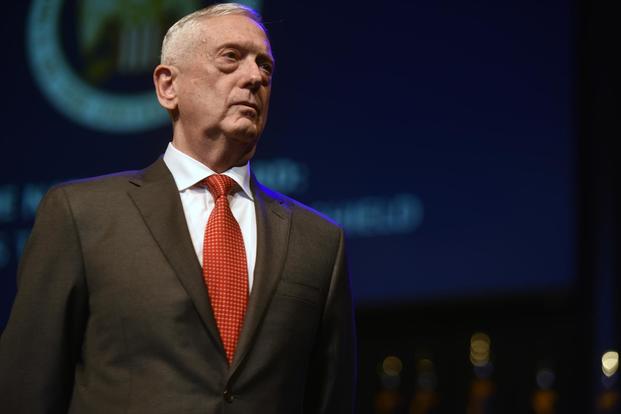Defense Secretary Jim Mattis on Tuesday warned against using private contractors in Afghanistan, even as a vigorous U.S. footprint remains there with no date in sight for nearly 14,000 troops to return home.
"When the Americans put their nation's credibility on the line, privatizing [war] is probably not a wise idea," Mattis told reporters during a briefing at the Pentagon.
Mattis comments were in response to the push from outside parties -- mainly Erik Prince, the founder of contracting security company Blackwater USA, now known as Academi -- to create a privatized fighting force in the country where the U.S. has been fighting its longest war.
NBC News reported this month that President Trump signaled a renewed interest in Prince's plan. Prince has proposed using former military specialists as contractors to conduct operations in Afghanistan over growing frustrations that the current Defense Department strategy isn't producing lasting results.
Related content:
- Outgoing US Commander Continues Tradition of Hailing Progress in Afghanistan
- Officials Still Working on New Strategy for Afghanistan: Mattis
- General: US Moving More Airpower to Afghanistan in Strategy Shift
Prince first detailed his idea last year when the White House, Pentagon and State Department were constructing a new South Asia strategy. Mattis at the time said that all options were being discussed.
Even after throwing cold water on the concept, Mattis and Chairman of the Joint Chiefs of Staff Gen. Joseph Dunford on Tuesday downplayed the idea of an unending, permanent and large-scale U.S. force.
"It's not a U.S. presence alone, and it shouldn't be implied that way," Mattis said. "We're there to ensure that America's security ... is not threatened out of that location," he continued, adding the U.S. has been preparing Afghan forces to someday take over the mission.
"We believe that the best way to get there is to ensure the Taliban recognizes they can't win on the battlefield," Mattis said.
In the long term, the U.S. will always have interest in the South Asia region, Dunford said.
"[We have] Diplomatic interest, security interest ... and we're going to maintain a presence to have influence in that region," the chairman said. "The form of that presence is going to change over time."
While the U.S. at the height of Operation Enduring Freedom had more than 100,000 boots on the ground, there are now just 14,000 U.S. troops in country, Dunford said.
The diplomatic mission will remain, he said, "[but] I certainly don't expect that the current forces that we have in Afghanistan represents an enduring, large military commitment."
Last week, the outgoing commander of U.S. forces in Afghanistan, Army Gen. John Nicholson, said there has been "significant progress" over the past three months for the Afghan forces despite Taliban offensives such as the recent large-scale attack on the city of Ghazni.
"There will be ups and downs, there will be leap-a-heads, there will be frustrations, there will be two steps forward, one step back from time to time. But the process has started and it wouldn't have happened without the South Asia strategy," Nicholson told reporters at the Pentagon earlier this month.
Army Gen. Austin Scott Miller will soon replace Nicholson as the 17th commander to oversee the American and NATO mission in Afghanistan.
Mattis on Tuesday disagreed that the Afghan forces "fell apart" after the attack on Ghazni on Aug. 10, which left 70 Afghan policemen dead.
Taliban forces launched had launched a major assault on the city, located within 100 miles of Kabul. During the fierce four-day fight, U.S. Air Force aircraft such as A-10 Warthog attack aircraft, F-16 Fighting Falcons and MQ-9 Reaper drones and U.S. Army AH-64 Apache helicopters had to be called in to reinforce Afghan forces.
The Taliban's objectives were thwarted by the U.S. presence, Mattis said.
"This is not an easy fight. We've never said it was. But I don't believe you can use this example as emblematic," he said. "They have not succeeded in taking down these towns and holding these towns and it's ... enormously easier to be the criminal in a town than it is to be a policeman."
"The fact is innocent people are vulnerable to terrorism," he continued. But the fight pushes on, with the Afghan Army "still in the field."
The press briefing marked the first public appearance for Mattis and Dunford since the Pentagon launched Tomahawk missile strikes on Syria in April.
-- Oriana Pawlyk can be reached at oriana.pawlyk@military.com. Follow her on Twitter at @oriana0214.










